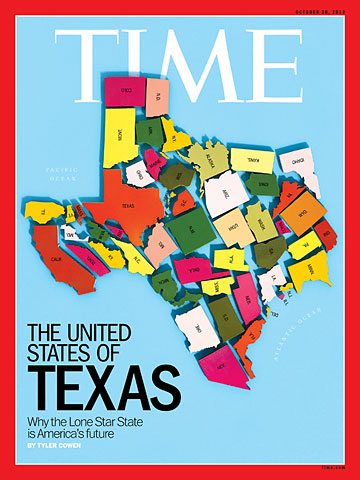
Correction Appended: Oct. 21, 2013
They say the Lone Star State has four seasons: drought, flood, blizzard and twister. This summer 97% of the state was in a persistent drought; in 2011 the Dallas--Fort Worth area experienced 40 straight days in July and August of temperatures of 100° or higher. The state's social services are thin. Welfare benefits are skimpy. Roughly a quarter of residents have no health insurance. Many of its schools are less than stellar. Property-crime rates are high. Rates of murder and other violent crimes are hardly sterling either. A recent report from the FBI found that the home state of Chuck Norris led the nation as the place the most people got punched or kicked to death in 2012.
So why are more Americans moving to Texas than to any other state?
Texas has acquired a certain cool factor recently. The pundit Marshall Wittmann has called it "America's America," the place where Americans go when they need a fresh start. The state's ethnic and cultural diversity has made places like Austin and Marfa into magnets for artists and other bohemians.
But I believe the real reason Americans are headed to Texas is much simpler. As an economist and a libertarian, I have become convinced that whether they know it or not, these migrants are being pushed (and pulled) by the major economic forces that are reshaping the American economy as a whole: the hollowing out of the middle class, the increased costs of living in the U.S.'s established population centers and the resulting search by many Americans for a radically cheaper way to live and do business.
One of these pioneers is Casey Colando. When he was just 19, he bought--sight unseen--five acres of Big Bend mountain desert country in Texas as an investment. It was just $300 an acre, far away both culturally and geographically from his native upstate New York. Four years later, in 2008, Colando moved to his homestead in the magnificent but remote region of West Texas.
A graduate of the State University of New York at Canton, where he studied alternative energy, Colando now lives with his wife Sara some 80 miles from the nearest town (Alpine, pop. 6,000). The couple bought more land adjoining their original property, and they run an alternative-energy business that serves various settlers who have moved to this isolated corner of Texas--helping their neighbors eschew what Colando calls "the big electric company" and live off the grid by installing solar and wind power.
Colando says he first tried to launch his alternative-energy business in upstate New York. "It was difficult work for a small business there," he says. "The costs were higher, and there were fewer business opportunities, more regulations. So I came out West, and I haven't looked back."
